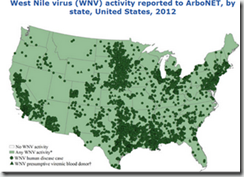#16,913
Thirteen years ago this month (Aug. 11th, 2009), a woman in Rochester, New York - who had recently returned from the Florida Keys - visited her doctor complaining of headache, malaise, and chills.
Although initially diagnosed and treated for a presumptive urinary tract infection, after her symptoms worsened an infectious disease specialist decided to test her for a disease not seen in the state of Florida in nearly 70 years; Dengue Fever.
She became the first (of more than 2 dozen) Dengue patients identified in and around Key West in the fall of 2009 (see 2010 MMWR report Locally Acquired Dengue --- Key West, Florida, 2009--2010).
A year later, the CDC would issue a report indicating far more people were exposed in Key West, although most developed only mild symptoms (see CDC Press Release Report Suggests Nearly 5 Percent Exposed to Dengue Virus in Key West).
The virus returned in 2010 with even greater numbers; infecting 65 – mostly in the Florida Keys - but also 1 person in Broward County, and another in Miami-Dade County.
Since then we've seen a few brief flare-ups of Dengue, particularly along the Southern tip of Florida (see 2013's Florida: Dengue Forces Suspension Of Blood Donations In Two Counties), but no large epidemics.
Our incessant COVID pandemic, a burgeoning Monkeypox crisis, and concerns over our H5N1 avian epizootic may have temporarily driven away other infectious disease concerns, but summer often brings surges in mosquito (and tick) borne illnesses, including West Nile Virus, Lyme Disease, and (rarely) Dengue fever.
As we've discussed often in the past (see EID Journal: Hx of Mosquitoborne Diseases In the U.S. & Implications For The Future), the United States is not immune to imported exotic mosquito-borne diseases.
West Nile Virus, which infects tens of thousands of people each year (killing hundreds), only first arrived in 1999, but quickly became endemic and spread across the nation.
Not that long ago Malaria, Dengue and Yellow Fever were fairly widespread and caused major epidemics in the United States (see map below).
 | |
| Outbreaks of yellow fever reported during 1693–1905 among cities comprising part of present-day United States. - Credit EID Journal |
Large swaths of the United States have mosquito species that would be competent vectors for Yellow Fever, Zika, Chikungunya, Japanese encephalitis, Rift Valley Fever, and Dengue.
And with predicted climate changes, those areas are likely to increase over time.
So we watch for new incursions of these vector-borne diseases - often introduced by infected international travelers - for any signs that they are getting a foothold. While two cases of Dengue in Miami-Dade is a far cry from public health crisis, it does remind us that these viruses are a real concern.
DOH-MIAMI-DADE REMAINS UNDER A MOSQUITO-BORNE ILLNESS ADVISORY FOLLOWING CONFIRMATION OF A DENGUE CASE
July 29, 2022
Press Release
MIAMI – The Florida Department of Health in Miami-Dade County (DOH-Miami-Dade) remains under a mosquito-borne illness advisory following the confirmation of an identified case of dengue in a Miami-Dade resident. This is the second local case of dengue infection in 2022.
Dengue is a virus spread through mosquito bites by Aedes mosquitoes which also spread the chikungunya and Zika virus. Most people infected with dengue have mild or no symptoms. Those that do develop symptoms typically recover after about one week.
The common symptoms of dengue are fever and one or more of the following symptoms: headache; eye pain (typically behind the eyes); muscle, joint, or bone pain; rash; nausea and vomiting; or unusual bleeding (nose or gum bleed, small red spots under the skin, or unusual bruising). Severe dengue can occur resulting in shock, internal bleeding, and death. If you or a family member develop the mentioned symptoms, visit your health care provider or local clinic.
The Florida Department of Health (DOH) continues to conduct statewide surveillance for mosquito-borne illnesses. Floridians are encouraged to report dead birds via the Florida Fish and Wildlife Conservation Commission’s site. For more information, visit DOH’s website at https://www.floridahealth.gov/diseases-and-conditions/mosquito-borne-diseases/index.html or contact DOH-Miami-Dade.
Which is why the Florida State Health Department urge residents and visitors to follow the `5 D’s’:


